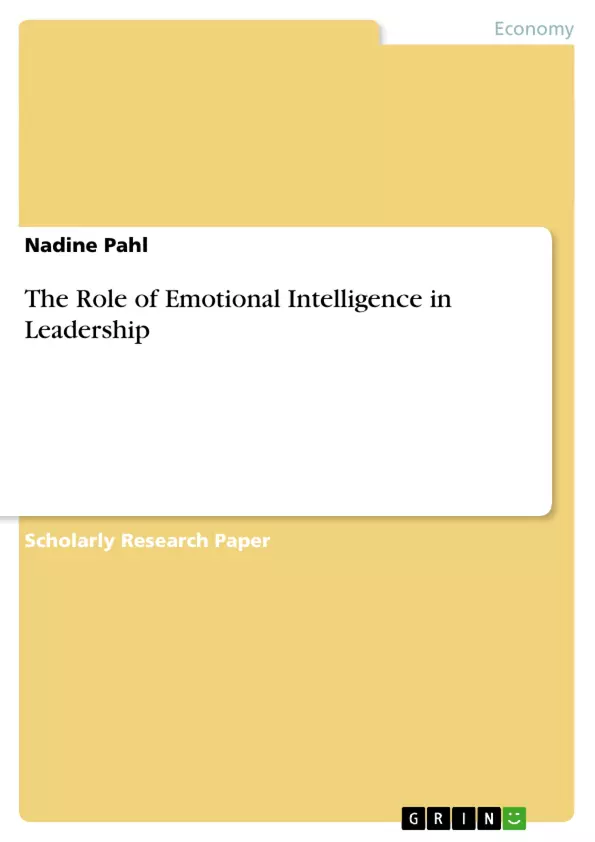Today, in a fast changing business environment, leaders need to manage an empowered workforce and go more and more beyond consultative, cooperative and democratic leadership styles. The today’s workforce does not accept an autocratic leadership style as they have now far more options and choices. In addition, there is a growing sense of democracy and independence in the workforce.
Emotional Intelligence has become a vital and more and more important part of how today’s leaders meet the significant challenges they face. Emotion is known to alter thinking in many ways. It seems that Emotional Intelligence can help leaders in an evermore difficult leadership role, one that fewer and fewer leaders seem capable of fulfilling. And especially in the highest levels in organizations Emotional Intelligence can give developing leaders a competitive edge. The bottom line is that the manager who can think about emotions accurately and clearly may often be better able to anticipate, cope with, and effectively manage change.
But provides the concept of Emotional Intelligence the answer to the question what the best leader differentiates from the average one?
The following assignment aims at clarifying the role of emotional intelligence in leadership. Chapter 2 gives an overview of the theoretical framework surrounding the emotional intelligence concept by stating the most important models and its measurements. Chapter 3 points out the leaders’ emotional
intelligence competencies to successful manage the organizations tasks. It also provides ways and even exercises of how to develop emotional intelligence and resonant leadership? To get the big picture, the last chapter explicitly summarizes the importance of emotional intelligence in the business field by also pointing out some critics to the Emotional Intelligence model.
Inhaltsverzeichnis (Table of Contents)
- Introduction
- Emotional Intelligence: Theoretical Framework
- Definition of Important Termini
- Models of Emotional Intelligence and its Measuring
- Leading with Emotional Intelligence
- It Is All About Primal Leadership
- The Four Dimensions of Emotional Intelligence: Goleman's Leadership Competencies
- How to Become a Resonant Leader: The Five Discoveries
Zielsetzung und Themenschwerpunkte (Objectives and Key Themes)
This assignment aims to clarify the role of emotional intelligence in leadership. It explores the theoretical framework of emotional intelligence, including key models and measurement methods. The paper then examines the application of emotional intelligence competencies in successful leadership, providing practical examples and exercises for development.
- The definition and theoretical frameworks of emotional intelligence.
- Models of emotional intelligence and their measurement.
- The importance of emotional intelligence in effective leadership.
- Practical application of emotional intelligence competencies in organizational settings.
- Methods for developing emotional intelligence and resonant leadership.
Zusammenfassung der Kapitel (Chapter Summaries)
Introduction: This chapter introduces the increasing importance of emotional intelligence in modern leadership, particularly in navigating complex and empowered workforces. It questions whether emotional intelligence provides the key differentiator between average and exceptional leaders.
Emotional Intelligence: Theoretical Framework: This section provides an overview of the theoretical underpinnings of emotional intelligence, defining key terms and exploring prominent models used for its measurement.
Leading with Emotional Intelligence: This chapter delves into the specific competencies related to emotional intelligence that contribute to successful leadership. It examines Goleman's model and explores methods for cultivating resonant leadership, including practical exercises.
Schlüsselwörter (Keywords)
Emotional Intelligence, Leadership, Goleman's Model, Resonant Leadership, Emotional Competencies, Leadership Styles, Organizational Management.
Frequently Asked Questions
Why is Emotional Intelligence (EI) crucial for modern leadership?
In today's fast-changing business environment, an empowered workforce no longer accepts autocratic styles. Leaders with high EI can better anticipate, cope with, and manage change effectively.
What are Goleman's four dimensions of Emotional Intelligence in leadership?
The assignment explores specific leadership competencies based on Goleman's model, focusing on how these dimensions help in managing organizational tasks.
What is "Resonant Leadership"?
Resonant leadership refers to leaders who are in tune with their emotions and those of their team, creating a positive emotional climate. The paper outlines "The Five Discoveries" on how to become such a leader.
Can Emotional Intelligence be learned or developed?
Yes, the assignment provides practical ways and specific exercises designed to help developing leaders improve their emotional intelligence and leadership edge.
Are there any criticisms of the Emotional Intelligence model discussed?
Yes, the final chapter explicitly summarizes the importance of EI while also pointing out common criticisms of the model in a business context.
- Quote paper
- Nadine Pahl (Author), 2008, The Role of Emotional Intelligence in Leadership, Munich, GRIN Verlag, https://www.grin.com/document/124628



